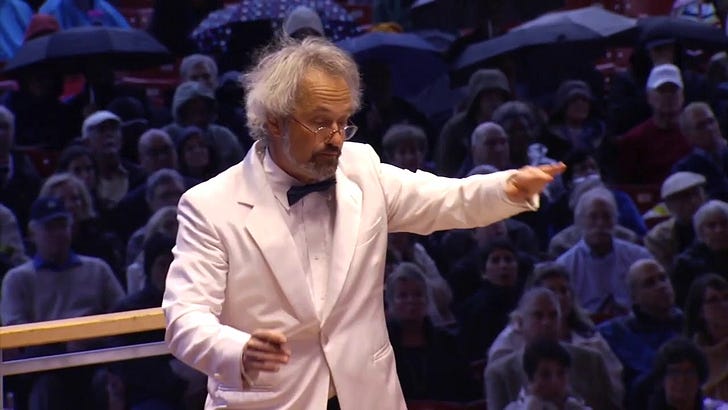📝 Thanks for reading Fran Magazine, a biweekly blog by Fran Hoepfner (me). The way this works is that Wednesday (regular) issues are free for all and Sunday (dispatch) and reread diary issues are for paid subscribers only. Consider subscribing or upgrading your subscription for access to more Fran Magazine, and feel free to follow me on Instagram or Letterboxd. 📝
TODAY IS THE LAST DAY YOU CAN ORDER A MUG
The Fran Magazine shop (“Fran Market”) is closes tonight at midnight (or whenever I go to bed). Get your mugs ASAP! This is your last chance this year. Or maybe ever??? Don’t wait!
It’s Tchaikovsky season
To move through the world in the month of December is to be bombarded with the music of Pyotr Tchaikovsky. Is The Nutcracker good? Is it bad? Is Wham!’s “Last Christmas” good? The answer to all of these questions is yes.
The music of Tchaikovsky, Beethoven, Mozart, even Stravinsky are likely familiar to us by the time we’re teenagers. The omnipresence in the cultural landscape suggests these are lesser composers, to some degree. Their work is easy to understand and memorize. The melodies are hummable. I was sick of The Nutcracker by the time I was 15, probably, eager to cast aside the work of Tchaikovsky for other, darker composers — Shostakovich, Bartok, Rachmaninoff, Brahms. That’s not to say The Nutcracker isn’t really good; it’s completely serviceable and often quite catchy. It’s for children, like the movie Wicked. And like the movie Wicked, it basically works,1 but there’s far better work for children out there. Prokofiev’s2 “Peter and the Wolf,” Ravel’s “Mother Goose Suite,” even Saint-Saens’s “Carnival of the Animals.”
When I’m listening to classical music and not relying on the curated shuffle that is public radio, I’m looking for some kind of ordering system to keep my mind clear and engaged as a listener. I want to be able to see patterns, personality. My methodology, if there is such a thing, in listening to classical music involves composer-centric deep dives, typically seeking out similar forms. I’ll do a sweep of symphonies, or a rush of concertos, or maybe just all overtures. Giving myself a structure through which to listen and understand a composer’s work lends some organization to the chaos of many century’s worth of music.
When I came back to the work of Tchaikovsky as not a child sitting in an audience of a local ballet production of The Nutcracker and instead a fully formed adult with a brain, I cast aside the ballets for his symphonies — the dark and stormy 4th, the triumphant 5th, the plaintive 6th. In college, we played Tchaikovsky’s 2nd Symphony, a piece I still can’t totally wrap my head around.
Over the summer, I went to the World Orchestra Week festival at Carnegie Hall to watch youth symphonies from around the world play classical music. Sitting through Tchaikovsky’s 5th Symphony for what I think might be the sixth time in my adult life — to say nothing of all the times I’ve queued it up on Apple Music — I thought: “I’m a little sick of this.”
I wrote off Tchaikovsky through the early fall, delving into Mahler and Brahms and Mendelssohn (“German guy fall”). Their moody works invoke romance or divinity, or sometimes both. This was perfect listening when I was on residency, but when I arrived back in chilly, frigid New York — already on the cusp of the holidays — I wanted a change.
Enter: Tchaikovsky, once again.
Listening to WFMT one morning, I heard a completely new-to-me piece by the Russian composer, as spirited and evocative as The Nutcracker without being, well, The Nutcracker. Enter: “Dances,” from The Oprichnik.
The Oprichnik was Tchaikovsky’s third opera3, set during the reign of Ivan the Terrible. The opera tells the story of lovers Andrey and Natalya, who cannot be together Natalya’s father, a local prince, has promised her to another man. Out of spite for the prince, Andrey joins the oprichniks — the paid bodyguards of the Tsar — with hopes of getting revenge on Natalya’s family. “Becoming a cop to get revenge against your true love’s dad” goes about as well as you might expect, in or outside of opera.
Many operas — The Oprichnik included — love to do little fakeouts in their final acts. You think you might be watching a comedy until it suddenly becomes drama, or vice versa. In the fourth act of the opera, Natalya and Andrey almost get married — before it all comes crashing down and he’s executed in front of her on their wedding day. Prior to that whole mishegoss, however, Tchaikovsky treats his audience to a bit of celebration which is where this particular piece comes from.
I was immediately drawn to the playfulness of the woodwinds in this particular piece. Part of what feels repetitive, maybe, about hearing The Nutcracker every single year is that many of those popular pieces are told from the point of view of a singular voice — this fairy, these dancers, the children, the rats, etc. The Dances from The Oprichnik depict a crowd — flutes talking to clarinets, horns talking to strings, cymbals clamoring over triangle, everyone bickering and dancing and throwing themselves around. There’s a mischievous quality to its opening few minutes, as if to suggest there’s something not right afoot. But none of that air of trouble gives way to the eventual tragedy of the opera.
The part that enthralled me when I heard the dances on the radio comes in at the 2:38 mark — a classic shift into the lyrical in the strings that I’m always a sucker for. You can get a whole lot of that in Dvorak’s Slavonic Dances too.
But that’s a whole other composer and a whole other country.
Part of what appeals year after year with The Nutcracker is the whirling, catchy enthusiasm of the music. It’s energizing to hear something like that — even when you’ve heard it a bazillion times. But it’s not the be-all, end-all of that type of music. For a long time I thought that learning about classical music involved understanding the functionality of symphonies and concertos and suites — wrong: you can just listen to all the dances, as many as you want, in any order, all the time, doesn’t have to be the end of the year.
It was through my Tchaikovsky dance-related deep dive that I discovered a different, semi-Christmas related piece of his from the opera Cherevichki (also known as The Slippers — no relation to Cinderella). These Russian dances and The Nutcracker and the dances from The Oprichnik share a lushness. They feel rich, even if they’re just little dances. The color is what makes Tchaikovsky’s music undeniable — whether it’s the booming repetition of his 5th Symphony or whirlwind of Sleeping Beauty or the plucky romance of Eugene Onegin. This season feels indulgent; the music you listen to should too.
I’ve abandoned the pretense of listening to brat (embarrassing) or the Wicked soundtrack (more embarrassing) or folklore (???) as I move through the chilly streets and otherwise embrace Tchaikovsky on my terms, as the season commands. On a commute late last week, I walked by three different Christmas tree stands, families huddled around picking out what they want. The number of children in the city seems to explode after Thanksgiving — but what can you do? They can listen to The Nutcracker blasting out of little speakers next to the unsold firs and pines. I’ve got all the Tchaikovsky I need.
What are you listening to as the year winds down? Don’t you think the Met Opera should do LESS Italian operas and MORE Russian ones? Are they doing fewer Russian operas “because of woke”? Sound off below.
Or doesn’t! Read Clare.
The first draft of this blog identified the composer of “Peter and the Wolf” as Stravinsky — a stupid mistake by me, a stupid person.
I’m not as familiar with the full lengths of Tchaikovsky’s operas outside Eugene Onegin, which is great!





for i believe the 2 years before covid 3 nutcracker songs were in my most played of the year. i kind of feel about tchaikovsky like i do about gladiator 2. i don’t know anything about it or why people like it or why i’m supposed to like it dislike it, nor do i like it or think that it’s good so much as it scratches a weird sensational itch like when i used the same eyebrows in the sims for 5 years. like this is exactly what ive been looking for
i want a whole fran ballet piece
Yes I do think the Met should do more Russian opera and less Italian opera. Like my favourite underrated Tchaikovsky opera Mazeppa. I'm (hopefully, probably) going to see Mazeppa next summer and that's getting me through the dark winter